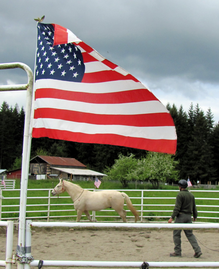 Photo Credit: PATH Intl.
Photo Credit: PATH Intl. REPC is based on the idea that people want to build positive and nurturing relationships, which facilitate growth and healing. Through the relationship with the horse, clients have the opportunity to create a new pattern for relationships and experience security needed to process and heal from trauma. Activities and techniques in REPC are designed to target specific goals such as relationship-building, self-regulation and mindfulness, and creativity. These activities may include choosing a horse, haltering the horse, leading the horse, grooming the horse, being with the horse, moving the horse, bathing the horse, and relaxation activities.
Participants in the study were military veterans with war zone-related trauma. Each veteran was asked complete a baseline phase prior to starting equine assisted counseling, during which they were evaluated each week using PTSD assessments. The second phase was to participate in REPC equine assisted counseling sessions for up to 18 weeks. The third phase tested each person’s PTSD symptoms for several weeks after counseling ended.
Some of the conclusions and implications of the study are:
- Participants perceived interactions with the horses as beneficial to them or as an important factor to their improvement.
- REPC may be beneficial in reducing severity and symptoms of PTSD after a triggering event, meaning participants who were “triggered” felt better more quickly while participating in REPC.
- Participants appeared to be highly motivated to attend sessions with the horses.
Dr. Sheade’s research is one of the few studies on equine assisted therapies with veterans. More research on the effectiveness of equine assisted counseling is needed. REPC is a unique, innovative approach to the field and we hope to do more research in the future.
Happy Veteran’s Day! Thank you to all veterans and their families for your service to our country. We are proud to serve you!

 RSS Feed
RSS Feed
